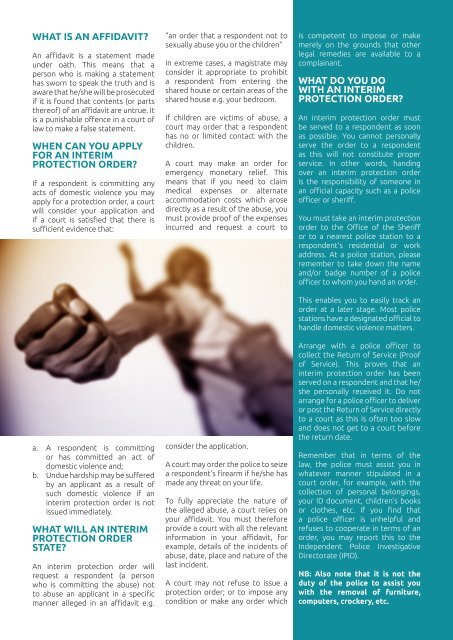201408-gcis-DomesticViolence
Create successful ePaper yourself
Turn your PDF publications into a flip-book with our unique Google optimized e-Paper software.
WHAT IS AN AFFIDAVIT?<br />
An affidavit is a statement made<br />
under oath. This means that a<br />
person who is making a statement<br />
has sworn to speak the truth and is<br />
aware that he/she will be prosecuted<br />
if it is found that contents (or parts<br />
thereof) of an affidavit are untrue. It<br />
is a punishable offence in a court of<br />
law to make a false statement.<br />
WHEN CAN YOU APPLY<br />
FOR AN INTERIM<br />
PROTECTION ORDER?<br />
If a respondent is committing any<br />
acts of domestic violence you may<br />
apply for a protection order, a court<br />
will consider your application and<br />
if a court is satisfied that there is<br />
sufficient evidence that:<br />
a. A respondent is committing<br />
or has committed an act of<br />
domestic violence and;<br />
b. Undue hardship may be suffered<br />
by an applicant as a result of<br />
such domestic violence if an<br />
interim protection order is not<br />
issued immediately.<br />
WHAT WILL AN INTERIM<br />
PROTECTION ORDER<br />
STATE?<br />
An interim protection order will<br />
request a respondent (a person<br />
who is committing the abuse) not<br />
to abuse an applicant in a specific<br />
manner alleged in an affidavit e.g.<br />
“an order that a respondent not to<br />
sexually abuse you or the children”<br />
In extreme cases, a magistrate may<br />
consider it appropriate to prohibit<br />
a respondent from entering the<br />
shared house or certain areas of the<br />
shared house e.g. your bedroom.<br />
If children are victims of abuse, a<br />
court may order that a respondent<br />
has no or limited contact with the<br />
children.<br />
A court may make an order for<br />
emergency monetary relief. This<br />
means that if you need to claim<br />
medical expenses or alternate<br />
accommodation costs which arose<br />
directly as a result of the abuse, you<br />
must provide proof of the expenses<br />
incurred and request a court to<br />
consider the application.<br />
A court may order the police to seize<br />
a respondent’s firearm if he/she has<br />
made any threat on your life.<br />
To fully appreciate the nature of<br />
the alleged abuse, a court relies on<br />
your affidavit. You must therefore<br />
provide a court with all the relevant<br />
information in your affidavit, for<br />
example, details of the incidents of<br />
abuse, date, place and nature of the<br />
last incident.<br />
A court may not refuse to issue a<br />
protection order; or to impose any<br />
condition or make any order which<br />
is competent to impose or make<br />
merely on the grounds that other<br />
legal remedies are available to a<br />
complainant.<br />
WHAT DO YOU DO<br />
WITH AN INTERIM<br />
PROTECTION ORDER?<br />
An interim protection order must<br />
be served to a respondent as soon<br />
as possible. You cannot personally<br />
serve the order to a respondent<br />
as this will not constitute proper<br />
service. In other words, handing<br />
over an interim protection order<br />
is the responsibility of someone in<br />
an official capacity such as a police<br />
officer or sheriff.<br />
You must take an interim protection<br />
order to the Office of the Sheriff<br />
or to a nearest police station to a<br />
respondent’s residential or work<br />
address. At a police station, please<br />
remember to take down the name<br />
and/or badge number of a police<br />
officer to whom you hand an order.<br />
This enables you to easily track an<br />
order at a later stage. Most police<br />
stations have a designated official to<br />
handle domestic violence matters.<br />
Arrange with a police officer to<br />
collect the Return of Service (Proof<br />
of Service). This proves that an<br />
interim protection order has been<br />
served on a respondent and that he/<br />
she personally received it. Do not<br />
arrange for a police officer to deliver<br />
or post the Return of Service directly<br />
to a court as this is often too slow<br />
and does not get to a court before<br />
the return date.<br />
Remember that in terms of the<br />
law, the police must assist you in<br />
whatever manner stipulated in a<br />
court order, for example, with the<br />
collection of personal belongings,<br />
your ID document, children’s books<br />
or clothes, etc. If you find that<br />
a police officer is unhelpful and<br />
refuses to cooperate in terms of an<br />
order, you may report this to the<br />
Independent Police Investigative<br />
Directorate (IPID).<br />
NB: Also note that it is not the<br />
duty of the police to assist you<br />
with the removal of furniture,<br />
computers, crockery, etc.


